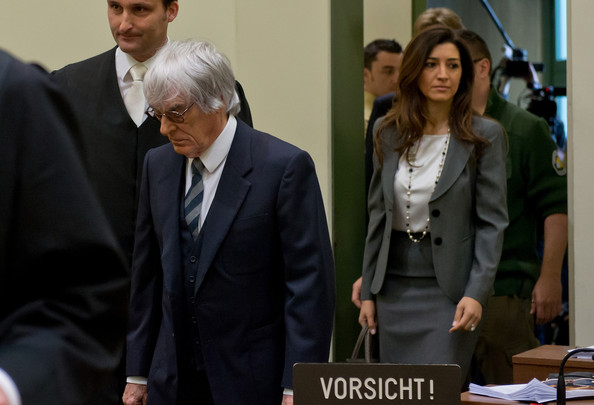Published May 7, 2013, Los Angeles Daily Journal – If the National Football League glimmers in the U.S. media spotlight, Formula One racing downright dominates the rest of the world. Set on a global stage, where races dance from continent to continent, the motorsports gala has become the sport of kings. In its 19-race season, the circuit traverses through Asia, the Americas, Europe and the Middle East, playing to sold-out arenas twice the size of the Super Bowl.
The economics of the sport are massive. Each race is broadcast to over 200 countries, attracting an average of 336 million television viewers per event. To put the number into perspective, the 2012 NFL regular season reached 200 million viewers for the entire season. The yield generated Formula One’s popularity is also enormous. Consider that Ferrari team driver Fernando Alonso – a name that many will not recognize – has an annual salary that exceeds that of Tiger Woods, LeBron James and Phil Mickelson combined.
The man who has stood atop of this empire for nearly 30 years is 82-year-old billionaire Bernie Ecclestone. If you don’t recognize him as being the fourth richest person in the U.K., you may recall that it was his 22 year old daughter Petra Ecclestone who purchased Aaron Spelling’s Los Angeles mansion in 2011 for $85 million in cash. At the time it was listed, the 56,000 square foot manor was the highest-price house in the U.S. Certainly, something every debutante needs.
Bernie Ecclestone has done yeoman’s duty in commercializing a sport that was once reserved for hard-core motorsports enthusiasts, and for this he has earned the nickname “F1 Supremo.” Ecclestone has been particularly canny about using the sport to commercialize emerging markets, bringing races to the likes of Abu Dhabi, New Delhi, Budapest, Kuala Lumpur and Bahrain. And for this, he has gained the reputation as being either the most innovative thinker in the history of the sport, or the toughest negotiator imaginable, extracting millions in race fees from host cities.
Ecclestone’s official role in Formula One is that of commercial rights holder. Ownership of the series has long been vested in a conglomerate of three banks that have permitted Ecclestone to serve as the face man and chief negotiator for the series. Yet a mid-2000s attempt by a New York hedge fund to purchase the series set in motion a chain of events that threatens to take down the man who built it all.
In 2005, approached German-owned bank, BayernLB, about purchasing its 46.7 percent interest in Formula One. On Oct. 4, 2005, after months of negotiation, Bluewaters offered to buy BayernLB’s shares for $1 billion in cash. Bluewaters also offered to beat any bona fide competing offer by 10 percent.
Bluewaters thought the deal was all but done, but they underestimated kingpin Bernie Ecclestone. On Nov. 25, 2005, London-based CVC Capital Partners issued an unexpected press release, announcing that it had purchased BayernLB’s shares in Formula One for $831 million. The other two banks, J.P. Morgan and Lehman Commercial, sold their interest to CVC two weeks later for $419 million, giving CVC complete ownership of the series. CVC agreed to keep Ecclestone on as the front man of the sport.
For the next five years, CVC enjoyed rich profits from the series. In 2007, it declared a $1 billion dividend, and in 2012 a second $1 billion was paid. That same year, CVC sold a 5 percent interest in the series to another bank consortium for $500 million, placing a valuation of Formula One at $9.1 billion.
The decision to sell the interest in Formula One to CVC for less money than had been offered by Bluewaters was more than curious to German officials – particularly given that the transaction was entered into by a German-owned bank. In January 2011, German authorities arrested Gerhard Gribkowsky, the chief risk officer at BayernLB in charge of selling the bank’s Formula One shares. The charge: accepting a $44 million bribe from Bernie Ecclestone to have the sale consummated with CVC, not Bluewaters.
And there’s more to it. The money trail shows that Ecclestone actually received the bribe money from BayernLB itself. Ecclestone claims that the payment to him from the bank was a finder’s fee for brokering the deal, but others believe that the finder’s fee agreement was simply drawn up by Ecclestone and Gribkowsky to enable them to use the bank’s money to fund the deal.
Whatever the case, the following is certain: At trial, Gribkowsky admitted to accepting the bribe, Ecclestone admitted paying the money, and Presiding Judge Peter Noll described Ecclestone as the “driving force” behind the payments. Gribkowsky is now serving an 8½-year sentence in a German prison, and officials are determining whether to charge Ecclestone.
The conviction has created a firestorm of litigation across the continents. Bluewaters has filed a civil complaint in New York against Ecclestone and Gribkowsky for fraud and tortious interference, seeking $650 million and punitive damages. BayernLB sent a formal demand to Ecclestone for $400 million it claims it lost as a result of the bribery scheme. And Dieter Hahn, an individual who had an agreement with BayernLB that was to pay him 10 percent for any sale over $1 billion, has filed a lawsuit against Gribkowsky and Ecclestone in the London High Court seeking $171 million in damages.
The situation at hand could be the beginning of Ecclestone’s long slide from quasi-royalty to fallen angel. Even for a man of wealth, the legal battles that lie ahead for Ecclestone are nearly immeasurable – saying nothing of the problems he will face if criminal charges are pursued. As has happened with many a man who has been seduced by the greed of power and money, this may be the last we see of our good friend Bernie.
